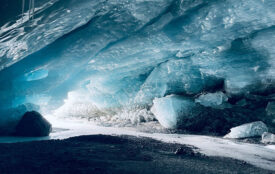The Anthropocene: Inconvenient Facts for a Human-driven Earth System
An international group of Earth scientists as well as scientists from other disciplines has determined that the impact of human activities on the Earth marks a new geological era: the Anthropocene.
The researchers, including Prof. Dr. Reinhold Leinfelder from Freie Universität Berlin, consider the beginning of the era to be the mid-20th century. The Anthropocene is characterized by the proliferation of materials such as elementary aluminum, concrete, plastic, fly ash, and the so-called fallout from nuclear weapon tests over the entire planet. All this is accompanied by increased emissions of greenhouse gases and unprecedented invasions of transglobal species. The findings were published in the prestigious journal Science.
In the investigation 24 members of the international Anthropocene Working Group demonstrated that human activities have changed the Earth system to such a great extent that a number of signals can be observed in sediments and ice. These signals are sufficiently different from the considerably more stable Holocene epoch of the last 11,700 years, which made the development of human civilization possible in the first place, to justify establishing an Anthropocene epoch in the geological time scale, according to the findings of the study. In 2016 the Anthropocene Working Group will continue to gather data about the Anthropocene that would support their recommendations whether the new time scale should be formalized and if so, how it should be formally defined and characterized.
The lead author of the study is Colin Waters (Secretary of the Working Group, British Geological Survey). The authors include Jan Zalasiewicz (head of the Working Group, Leicester University) as well as a number of other authors including Prof. Dr. Reinhold Leinfelder, who heads the Geobiology and Anthropocene Research Group at the Institute of Geological Sciences at Freie Universität. He also heads the research project “Anthropocene Cuisine” at the Excellence Cluster “Image Knowledge Gestaltung” of the Berlin universities and is the founding director of the Berlin House of the Future (Haus der Zukunft), which is currently under construction.
The scientists are investigating whether human activities have driven the Earth into a new geological epoch – the Anthropocene. They are addressing issues such as: To what extent are human activities recorded as measurable signals in geological strata, and to what extent does the Anthropocene differ worldwide from the much more stable Holocene epoch of the last 11,700 years, which allowed for the development of the human civilization?
The Holocene was a time during which human societies evolved through the gradual domestication of landscapes to food production, through the construction of cities and the development of skills they needed for utilizing the water, mineral, and energy resources of the planet. The Anthropocene epoch now proposed by the scientists, on the contrary, is characterized by particularly rapid environmental changes that are resulting from the extremely rapid increase in the human population and the greatly increased use of resources during the “Great Acceleration” from the middle of the 20th century onward.
Publication “Colin Waters et al. (2016) The Anthropocene is functionally and stratigraphically distinct from the Holocene” Science
Source
Freie Universität Berlin | Prof. Dr. Reinhold Leinfelder 2016








